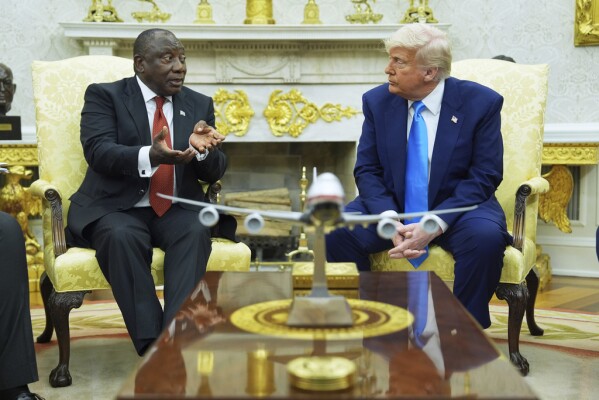WASHINGTON D.C. – In a highly unusual and diplomatically fraught encounter, President Donald Trump reportedly blindsided South African President Cyril Ramaphosa in the Oval Office with an aggressive line of questioning concerning alleged “large-scale killing of farmers” and “white persecution” in South Africa. The impromptu and confrontational exchange, detailed in a new book, immediately sent shockwaves through diplomatic circles and exposed a deep ideological chasm between the two leaders.
The incident, which occurred during Ramaphosa’s 2019 visit to Washington, is said to have unfolded during a closed-door meeting intended to focus on trade, investment, and bilateral relations. Instead, according to the account, Trump abruptly veered the conversation towards deeply sensitive and often racially charged allegations surrounding land reform and violence against white farmers in South Africa.
“You’re allowing large-scale killing of farmers,” Trump reportedly asserted, directly confronting Ramaphosa. He then pressed further, according to the book’s narrative, asking, “And you’re allowing white persecution. What are you doing about that?”
Sources close to the discussions, speaking on condition of anonymity due to the sensitive nature of diplomatic interactions, described Ramaphosa as being visibly taken aback by the unexpected ambush. South African officials present were reportedly “appalled” by the former President’s direct and unsubstantiated claims, which echo narratives often promoted by right-wing and white nationalist groups internationally.
The South African government has consistently refuted claims of a “genocide” or “persecution” of white farmers, though it acknowledges the serious issue of rural crime affecting all communities. Land reform, aimed at redressing historical injustices of apartheid-era land dispossession, remains a contentious but constitutionally mandated policy in South Africa.
The confrontation reportedly left the carefully orchestrated diplomatic agenda in tatters. While Ramaphosa maintained his composure and attempted to steer the conversation back to mutually agreed-upon topics, the incident cast a long shadow over the visit and underscored a profound misunderstanding, or perhaps deliberate misrepresentation, of the complex realities within South Africa.

Image source: AP
This alleged Oval Office confrontation is not the first time Trump has publicly waded into the issue of land reform in South Africa. In 2018, he famously tweeted that he had asked then-Secretary of State Mike Pompeo to “closely study the South Africa land and farm seizures and expropriations and large scale killing of farmers.” That tweet, based on a segment from Fox News, drew a sharp rebuke from the South African government at the time, which accused him of spreading “false information.”
The revelation of this direct confrontation within the sanctity of the Oval Office paints a stark picture of a U.S. foreign policy that, under the former administration, was willing to prioritize ideologically driven narratives over established diplomatic protocols. It also highlights the persistent challenge for South Africa in countering misinformation campaigns that seek to undermine its efforts towards social and economic transformation.
Neither the office of President Trump nor the South African Presidency has yet commented publicly on these specific claims from the forthcoming book. However, the report is set to reignite debate over the complexities of land reform in South Africa and the often-unpredictable nature of high-level diplomatic engagements during the Trump presidency. For President Ramaphosa, the encounter reportedly served as a blunt reminder of the enduring challenge of engaging with an international leader driven by a distinct, and often controversial, set of political priorities.